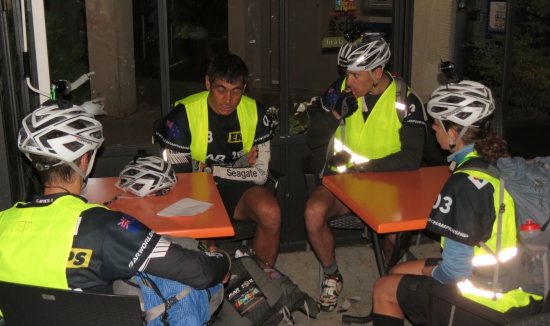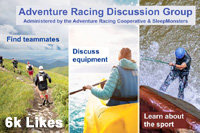Adventure Race Strategy (Part Six of GODZone - What’s The Plan?)
Nathan Fa'avae / 27.04.2020

It’s all about pacing. If the start line of an expedition race was an intelligence test the results would be disturbing. If I said after you read this go and run 500-kilometres non-stop, I’m going to guess you wouldn’t start by sprinting. Yet, in an adventure race that seems to be the norm. I have witnessed some crazy behaviour at the start of a race, people putting themselves in danger to save a few seconds. I’ve seen a team warming up before the start doing sprints. Starting a race at high speed puts people at unnecessary risk of hurting themselves and forcing their team out of the event, plus danger that could cause them serious harm.
(Ed. The photo above was taken just before the start of the 2012 World Champs. Team Seagate were the only ones sitting down waiting for the start.)
My advice to 90% of teams is; don’t get sucked into racing. An adventure race is different to most other races. It’s more of a time trail against the course and clock rather than a race against other teams.
It’s commonly said in adventure racing that teams stress about minutes on day 1, only to throw away hours on day 2. Racing other teams is mostly a distraction from your own teams needs. My experience is that many teams, certainly at the elite level, are more reactive than proactive. Rather than making their own plan and racing to that, which should be based on their team’s strengths, they focus more on what other teams are doing and this is nearly always detrimental.
Most teams start too fast, then members start to struggle, the team loses momentum and fades back through the field, being passed by teams that paced sensibly from the start for the task ahead of them. Pace needs to reflect the level of training the team has done.
The other important factor in race strategy is realistic goals. Adventure racing as a sport rewards those with experience. While sport can produce phenomenal surprises, it’s extremely rare for an inexperienced team to win a major race, safe to say, it doesn't happen.
By all means have ambitious goals, but keep them achievable and keep it real. If you start too fast, you won’t recover in time to compensate for the error, but if you start too slow, you can increase your speed later in the race, or race with less rest, the end result being you’ll move more smoothly through the course with less mistakes.
Read the final part of the article on 'Adventure Race Training and Skills' here.
Sponsors
AVAYA, RAB, inov-8, Santa Cruz, Torpedo7, THINK Kayaks, Saltstick, Em’s Power Cookies, Absolute Wilderness Freeze Dried Meals, SUUNTO, Frontier Packrafts, BMG Toyota, Tineli, Xinix
Nathan Fa'avae is the captain of Team Avaya (formerly Team Seagate) and 6x Adventure Racing World Champion. He is also a Race Director of the Spring Challenge and Absolute Widerness Adventure races in New Zealand, and a co-owner of Absolute Wilderness Freeze Dried Foods. You can find out more about him at https://nathanfaavae.nz/






 SleepMonsters
SleepMonsters



